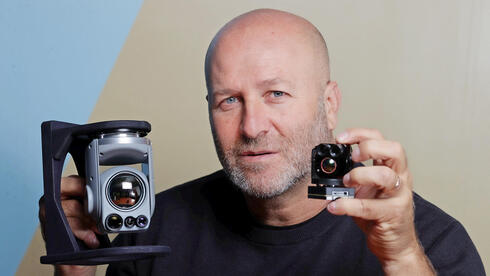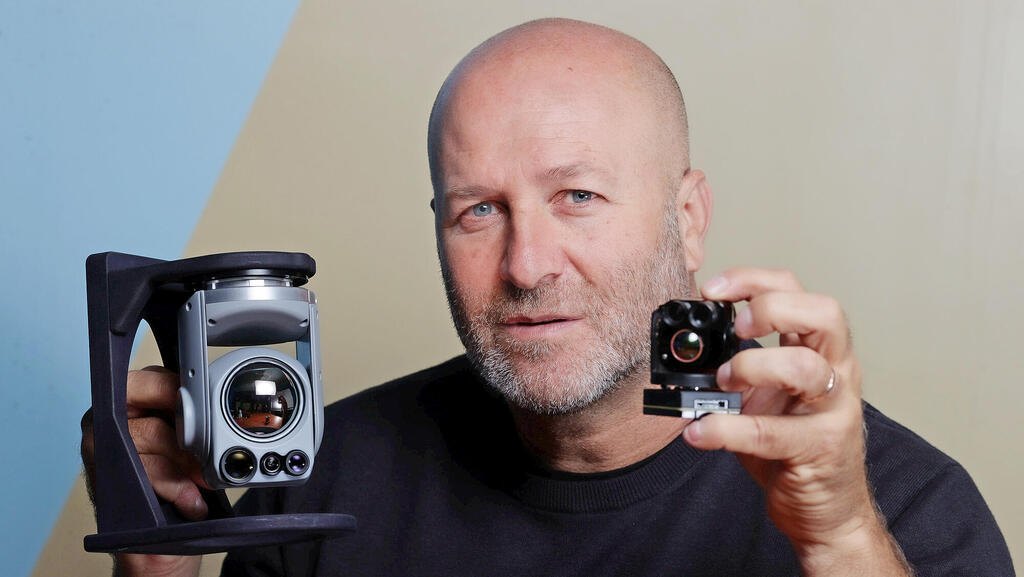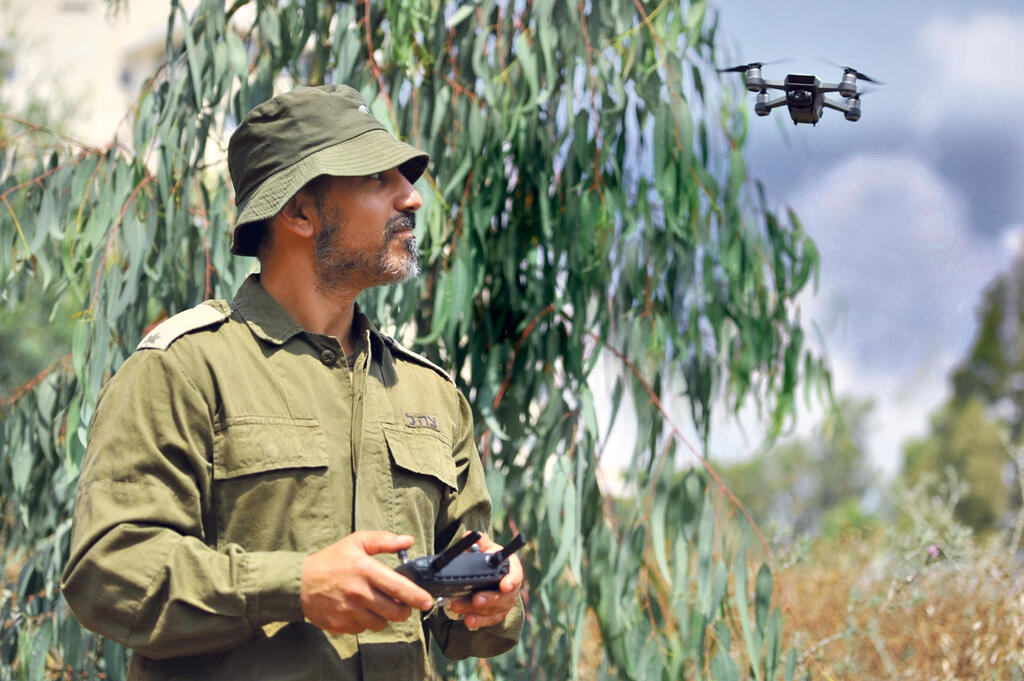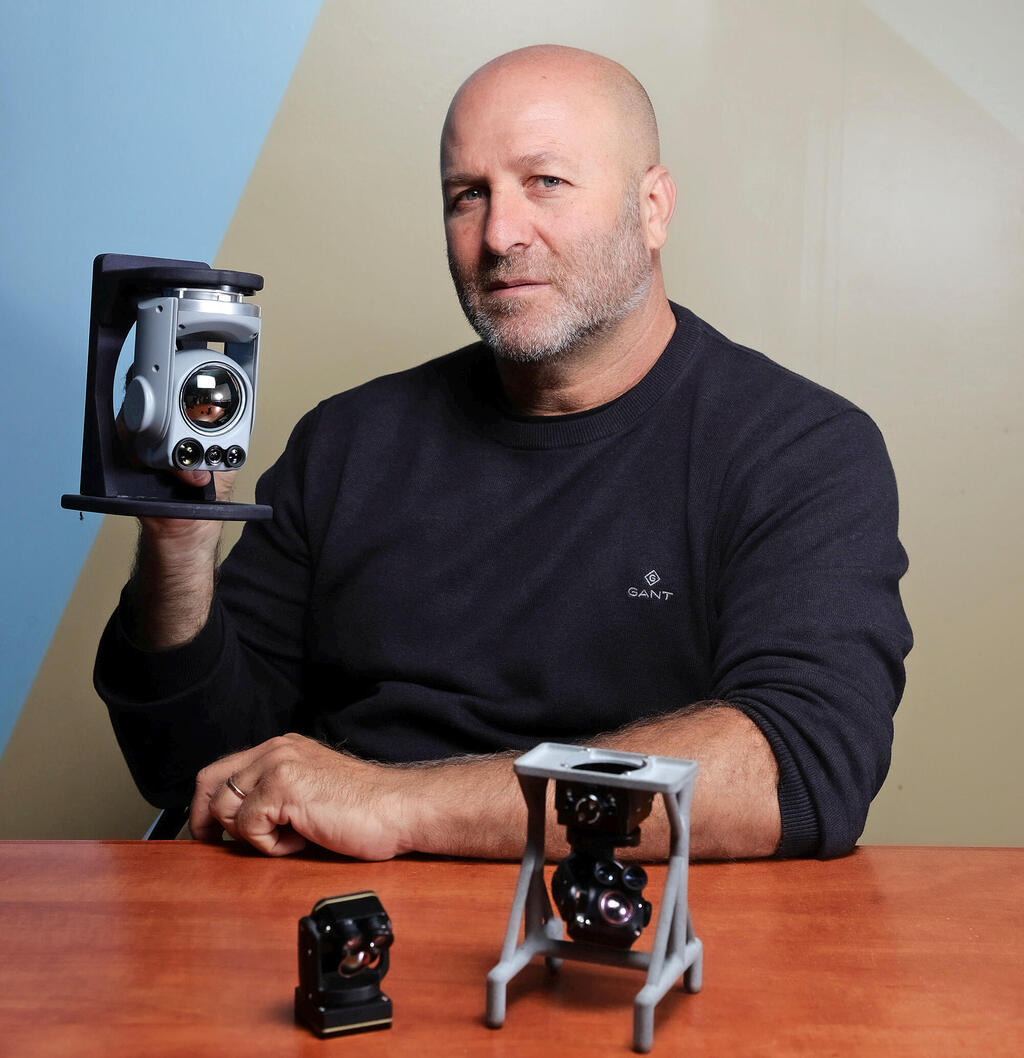
The Israeli startup selling drone cameras to armies across the world
NextVision manufactures tiny cameras for drones and UAVs which have become the eyes of armies around the world. Founder Chen Golan, a former Air Force pilot, tells Calcalist how his small startup has reached a value of $620 million
"Wars help us sell more cameras. It's unfortunate, but true, because there is a real need here that we are responding to," says Chen Golan (54), a former fighter pilot and the co-founder and chairman of NextVision, a manufacturer of tiny cameras for UAVs and drones. But he emphasizes that there is no joy in battle here. "Our cameras allow the soldiers to see what is happening in the field in real time, thus saving lives."
It is difficult to understate the magnitude of NextVision's achievement. In 15 years, the company has turned from a modest startup into a world leader in its field, serving as the eyes of drones and UAVs of huge manufacturers, mainly of defense companies such as the Israel Aerospace Industries, Rafael, Aeronautics and Elbit. Just last week, it received the largest order in its history for cameras and other products worth $20.4 million. And while the technology stock market is shrinking, and the hot air is coming out of all the companies that raised funding according to inflated values, NextVision is only getting stronger: in 2021 it was issued at a value of 400 million shekels, and since then its value has soared to 2.3 billion shekels (approximately $620 million). This month it also entered the TA-125 index (the 125 leading public companies in Israel) - another important landmark, which significantly increased trading in its stock.
Naturally, wars are good for NextVision's business: its revenues have grown since the beginning of the year by 85% compared to the same period last year, and net profit has jumped by 160%. And in the first month of the war in Gaza, the company's sales rate doubled. "The war in Gaza has certainly increased demand, but we are not in any way happy that there is a war in Israel if that’s why you’re implying," says Golan. "If wars are good for business, then we are happy for the world to explode? We are happy to help where possible, that's why we added working hours and defined unequivocally that an Israeli customer now receives first priority, even though Israel only accounts for 20% of our sales."
The war in Gaza did not give rise to the sales boom, but only increased it. The entire industry has experienced growth in recent years thanks to the technological leap in the quality of drones, and even more so since February 2022, when the Russian army invaded Ukraine and plunged the world into a procurement fever it had not known since the Cold War era. Compared to any other previous military conflict, the drones occupy a central role in the ongoing war in Ukraine, in missions to gather tactical intelligence and attacking specific targets.
"The world is going in the direction of drones," says Golan. "The war in Ukraine and what happened to us on October 7th were a wake-up call for Europe after ten years in which they fell asleep, and now they have moved to defensive arming, and this is where the world of drones and UAVs enters on a large scale. These are tools with amazing capabilities, which know how to bring real-time intelligence to the forces in the field. You don't need to take off from some base, you just take one out and check what's beyond the hill. And there is also a whole world of 'suicide' drones, which is surgical treatment of targets with a UAV. Instead of hitting a terrorist in a vehicle, which can kill civilians. Your UAV is looking for the right target to hit point-blank."
Hamas adopted some of these fighting techniques in the surprise attack against Israel on October 7, when drones that took off in Gaza were directed at the fence along the border with Israel: drones carrying weapons circled over tanks and APCs parked at IDF posts and attacked them; Others were directed towards the high masts on top of which were placed remote-controlled firing systems, radars and means of observation, blowing them up and putting them out of use.
Are your cameras used by the IDF?
"Yes. As far as security applications are concerned, we have an advantage. Until recently, Chinese companies accounted for 70% of the market, but then the trade war broke out, the United States government decided that it would not allow Chinese products to be in its military, and we are a very good solution to this problem. NextVision lives and breathes on this wave. We predict double-digit growth in the next ten years, because the field of drones, which started only ten years ago, has not yet reached its peak maturity."
Do your cameras have applications outside of the battlefield?
"There are many possible future applications. Firefighting, for example. A drone with our camera can locate the fire and see where it is moving in order to guide the firefighting forces accordingly. Cameras like ours can be used to send packages. In areas without GPS reception, where you have to navigate based on an image, our camera is becoming super relevant. So we have a lot more room to develop in the coming years."
A no-frills office
The NextVision offices in Ra'anana are quite dull. The company is run with frugality, and not only are its offices devoid of any of the indulgences common in high-tech companies, there is not a single non-functional thing in them, not even pictures on the wall. Golan himself doesn't even have an office - he works from a meeting room until it’s needed, then he just moves from room to room, looking for a new corner to settle in. "We run the business as lean as possible," he explains. "There is no nonsense here and you won't find any luxury here. From the first day of the company, I make sure that every shekel goes to the right place."
Golan opens a window, points to a vehicle leaving a nearby parking lot and shows it to me through the Next Vision camera: "Do you see this square? This is the lock on the target, with which you mark the target. Do you lock on the vehicle or the person? Now the camera focuses on both and follows both automatically, wherever they go." Golan points to a sign a few hundred meters away, and shows me through the camera that you can read the small inscription on it - details that the human eye does not distiguish at such a distance.
The key to NextVision's technology is image stabilization: it produces small cameras, weighing 140 grams to 2 kg, that manage to produce a stable image despite the movement of the drone in the air. "The image shakes terribly when you try to zoom in on a certain detail," explains Golan. "And with our camera, the image becomes stable all at once." The light weight of the camera is critical to the performance capabilities of the miniaturized electric aircraft - aircraft can carry accessories at a ratio of 1:5 to their weight, and the lighter the camera the less energy it consumes, extending the duration of the flight.
Recently, the company also entered the field of cooled cameras, where the sensors are cooled to a temperature of minus 120 degrees - which allows them to drastically increase the observation range, by almost five times compared to non-cooled cameras.
Why is it critical to stabilize an image in real time?
"This is of crucial importance in military operations. When drones have observation missions that save human lives, listening missions, or explosives that are homing in on a target in order to hit it - we must not have a delay. These few seconds that it takes for a normal camera to stabilize impair a commander's ability to give an order to homing in on the target. This world is really developing, especially in urban wars within populated areas with civilians. Our tools make it possible to target targets without causing too much peripheral damage."
How do you stabilize an image while moving?
"It starts with mechanical stabilization using gimbals - a 2-3 axis gimbal system that wraps around the camera, places the target in the center of the field of view, and helps stabilize it while moving. We complement the mechanical stabilization with digital stabilization. This is a complex task because you actually have to help the camera decipher from the image what is the object to be homed in on, what is shaking in the photograph, what needs to be corrected and how."
Are your cameras used more for offensive or defensive purposes?
"It depends on the user. In the end, we sell components to systems that are not ours, and we are not the ones who determine what they will do. In a sense, we are out of the loop."
Nevertheless, you sell to UVision, for example, which produces "suicide" drones. Isn't it hard for you morally?
"If you told me that UVision was attacking Israeli Navy ships and killing innocents, I would close the company and go home. But when it comes to those who attack our enemies, guard our soldiers, and protect our citizens from terrorism, I sleep well at night. A terrorist looking for such a solution will not find it with us."
The scars from the army and high-tech
Golan lives in Tel Aviv with his wife Tzurit, Chief People Officer at the information security company Pentera. They are the parents of two daughters, who are following in their father's footsteps - the eldest used to operate a simulator of attacking drones ("I like to talk to her about my cameras"), and the younger one is serving in the navy.
He grew up in Beit Yitzhak, the son of a farmer and a school principal, but above all - he is the scion of a dynasty of pilots. "There are seven pilots in the family," he says. His brother was a squadron commander and is currently a pilot with El Al, and two of his uncles and three of his cousins were navigators and pilots. "Fighter pilots are aerial animals. This does not mean that they are good commanders, it just means that they know how to get along in the air. You also need a missional, competitive nature, but piloting itself is an acquired skill."
How do you catch the piloting bug?
"When I was a child, they took me on a tour of the Tel Nof Airbase, in the squadron where my uncle served as a Phantom navigator. When we saw the Phantom turn on its engines, all the eucalyptus trees behind me bent from the force, and I said, 'Wow, that's what I want - to be a pilot!' I fought for it with all my might. My friends would go play basketball and I would keep studying for another three hours into the night to memorize information until the things forcefully entered my head, because I am dyslexic. I really wanted it."
Golan succeeded in the task he set for himself: he flew F15 and F16 planes; was a partner in the establishment of the strategic squadron at the Hatzerim Airbase; He advanced to become a deputy squadron commander and then a squadron commander at the flight school. At the same time, he also completed a bachelor's degree in business administration at the IDC (now Reichman University), with a specialization in information systems and entrepreneurship. But his big dream - to be a squadron commander - he was not able to fulfill. "Being a squadron commander was my vocation in life," he says. "I am task-oriented, I run forward and I am not afraid of a struggle, even when I am required to go against the flow. So I fought and progressed, until at a certain point it no longer suited me. I felt that I was expected to be a yes-man in order to progress, and I couldn't."
At the age of 36, Golan moved from the army to the high-tech market and began working as a sales manager at Chip PC of the couple Ora Meir-Sofer and Aviv Sofer, which developed hardware for computers in the field of security. "I found myself dealing with big projects and working like crazy. At Chip PC, I also met Boris Kipnis, who would later be the technological brain of NextVision. I recruited him to the company as a brilliant development engineer, and then, when we founded Xseed, I took him on as VP development".
In 2006, in the midst of the Second Lebanon War, Aviv Sofer founded another startup - Xseed, which developed a kind of laptop computer for soldiers - and took Golan with him. "I founded the company," says Golan. "I was a founder, but without the stocks. I interviewed people, set up teams, and planned budgets." Within a year Xseed was sold to Elbit, and according to Golan, "I was supposed to be CEO, but due to organizational political reasons in the purchasing company, I had to give up."
So have you and Boris actually enjoyed an exit yet?
"We didn't see a shekel. I was an army man and that's where I learned my first lesson in citizenship - that if you don't take care of your interests, no one will take care of them for you."
The disappointment he experienced in the private market brought Golan back to the Air Force. "They said to me: 'What are you giving up on? But in the same breath there were those who said to me: 'You have upset a lot of people in the IDF. You will no longer be a squadron commander. Finally I returned to the weapons development department. I managed a significant project at IAI, and I felt that I was good. Still, it was hard for me to get up in the mornings. I realized that I was not happy to get up for work. I felt that I was in a place that destroyed me more than it built me up. And I realized that a change was needed, so after eight months in the army, I decided to retire for good. The day I left, a course for El Al pilots opened, and that's where I moved."
Golan was attracted to El Al with mixed feelings. "I asked myself if this is why I left the army," he recalled. "I had a good time at El Al, but it wasn't enough for my entrepreneurial nature. The big advantage of the position is that it provides a very convenient platform for entrepreneurship, because when you're not flying, you're pretty much free. So I had time to develop the idea that Boris proposed to me a few months earlier.
"He came to me and said: 'I have an idea for how to make cameras for small drones in a different way than anything on the market today'—and that turned me on. Because Boris is a genius, one of the sharpest people in solving problems. He is strong on the technological and development side, and I, as a fighter pilot, knew the applied side of the systems. So I said, 'Come on, how do we take this to the field of UAVs and drones?'"
This meeting happened in 2007, and within two years NextVision was officially established. During all this time, Golan worked at two jobs: an El Al pilot and a high-tech entrepreneur. "I would fly routes to Europe, the United States, Canada and the East, and after landing, instead of going out for a walk or eating with the crew, I would work. Every spare minute I put in orders and worked with Boris. I had no life, but I had a purpose again."
His dual work would continue long after NextVision was already on its feet and a success - in fact, only in 2021, in preparation for the company's IPO on the Tel Aviv Stock Exchange, did Golan leave El Al.
Was it hard for you to say goodbye to being a pilot? You are at an age where fighter pilots are no longer called up for the reserves.
"I thought it would be the biggest crisis of my life. The day you stop flying is such a ceremonial day, at the end of which you are given an official stamp in the squadron that you don't fly anymore. When you turn off the engines from the last flight, you want to cry. There are some who cry, but I couldn't allow myself to cry, because flying with me was my navigator and I was her commander."
How do you get over it?
"For the first two weeks, I walked around like a bird with clipped wings. I had an ultralight, it's a tiny airplane that's like the all-terrain motorcycle of the planes, it's abnormally fun. This is my escape to a place I love. I sold the ultralight I had, and now I'm building one with a partner. But the bottom line is what helped get me out of missing piloting was the founding of NextVision. I'm operational and task-oriented, so establishing the startup helped me to be drawn to something I love and disconnect from piloting."
"I tried, I suffered and I succeeded"
NextVision was founded in April 2009 by Golan and Kipnis, and within half a year they were joined by Michael Grossman, whom Boris knew from 8200, as a founding partner and CEO of the company, after gaining experience in the defense high-tech field. "We are three entrepreneurs who are totally different from each other, but together function like a machine," says Golan. "I'm in the operational field, Michael in the management, business and sales side, and Boris in the technology and development side. We have been together for 15 years. We also have disagreements, but in the end it's a marriage that works well. Until the IPO, we raised only $1.5 million. The first investor who believed in us was Amiram Levin (former commander of the Northern Command and deputy head of the Mossad). We had to amass small investments, for example from a pilot who flew with me and said: ‘Ok, I like it.' And the rest is history."
Is there a company that competes with your photographic solution?
"There are companies that compete with us, but not in the order of magnitude of our sales."
Are you competing with the big companies?
"No, we sell to them. Drone manufacturers are our customers, such as Elbit and the IAI. They are good at cameras for large tools, which they manufacture themselves. Whereas we are the Sayeret Matcal (General Staff Reconnaissance Uni) for the small cameras. I guess it pays them more to work with us in this field."
If you are so essential and unique, how come you haven't been bought yet?
"You don't need to buy a cow for a glass of milk. On the other hand, if you want to dominate the market, it's worth buying the only cow on the market. If an interesting offer comes along, we'll look at it, but that's not our goal."
A little too late, isn't it? You are already too expensive.
"We are expensive, but the volume of activity is only increasing, because the field of drones has not yet reached peak maturity."
Next Vision employs only 63 people. That’s not a lot for a company of your value.
"The day I raised money, I could have brought in 150 workers in one fell swoop, and what would have happened? Hidden unemployment and a mess. I don't believe in that. We grow at a controlled rate."
Are you satisfied with your transformation into a public company?
"I don't regret successful things, and our IPO was successful. NextVision has been in a good place since then. The only downside is the transparency to the public. Suddenly your brother's friends write to him telling him how much you earn. It's like you are undressed in front of everyone."
Was the IPO a correction for you to Xseed’s exit, from which you did not see a shekel, and to the dream of being put in command of a squadron?
"I wasn't looking for corrections because I don't look at things that way in my life. What happened with Xseed was for me a learning experience, not a failure. Is it possible to look at the IPO as an alternative exit? Maybe. But I didn't establish NextVision because I wanted to fix things, but because I wanted to build something of my own from scratch.
"I love everything I've done in my career, in the army, in high-tech and at El Al. I took my destiny in my own hands, it was a risk, and it seems that I directed it to the right places. Because if I had been a squadron commander or stuck in Xseed as an employee, I probably wouldn't have founded the company with Boris. So it's lucky that I moved on. I tried, I suffered and I succeeded."
First published: 13:42, 10.12.23
















